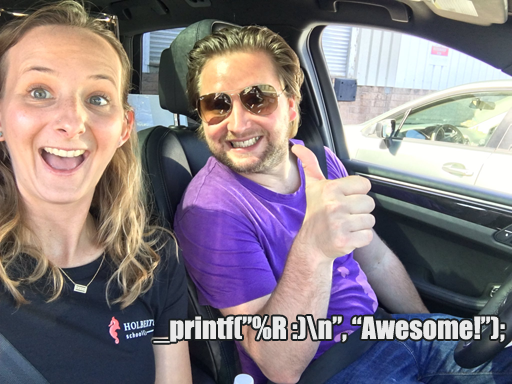By Nancy Nyambura [@Nancyenos] and Yemsal Saliu [@Yemsal4media]
Project Start: Apr 21, 2023 6:00 AM Project Ends: Apr 26, 2023 6:00 AM
For this project, students are expected to look at these concepts:
Write your own printf function.
^ In this picture, Kris, and Jul
Read or watch:
- Secrets of printf
- Group Projects concept page (Don't forget to read this)
- Flowcharts concept page
man or help:
printf (3)
- Allowed editors:
vi,vim,emacs - All your files will be compiled on Ubuntu 20.04 LTS using
gcc, using the options-Wall -Werror -Wextra -pedantic -std=gnu89 - All your files should end with a new line
- A
README.mdfile, at the root of the folder of the project is mandatory - Your code should use the
Bettystyle. It will be checked using betty-style.pl and betty-doc.pl - You are not allowed to use global variables
- No more than 5 functions per file
- In the following examples, the
main.cfiles are shown as examples. You can use them to test your functions, but you don't have to push them to your repo (if you do we won't take them into account). We will use our ownmain.cfiles at compilation. Ourmain.cfiles might be different from the one shown in the examples - The prototypes of all your functions should be included in your header file called
main.h - Don't forget to push your header file
- All your header files should be include guarded
- Note that we will not provide the
_putcharfunction for this project
write(man 2 write)malloc(man 3 malloc)free(man 3 free)va_start(man 3 va_start)va_end(man 3 va_end)va_copy(man 3 va_copy)va_arg(man 3 va_arg)
- Your code will be compiled this way:
$ gcc -Wall -Werror -Wextra -pedantic -std=gnu89 *.c
- As a consequence, be careful not to push any c file containing a
mainfunction in the root directory of your project (you could have atestfolder containing all your tests files includingmainfunctions) - Our main files will include your main header file (
main.h):#include main.h - You might want to look at the gcc flag
-Wno-formatwhen testing with your_printfand the standardprintf. Example of test file that you could use:
alex@ubuntu:~/c/printf$ cat main.c
#include <limits.h>
#include <stdio.h>
#include "main.h"
/**
* main - Entry point
*
* Return: Always 0
*/
int main(void)
{
int len;
int len2;
unsigned int ui;
void *addr;
len = _printf("Let's try to printf a simple sentence.\n");
len2 = printf("Let's try to printf a simple sentence.\n");
ui = (unsigned int)INT_MAX + 1024;
addr = (void *)0x7ffe637541f0;
_printf("Length:[%d, %i]\n", len, len);
printf("Length:[%d, %i]\n", len2, len2);
_printf("Negative:[%d]\n", -762534);
printf("Negative:[%d]\n", -762534);
_printf("Unsigned:[%u]\n", ui);
printf("Unsigned:[%u]\n", ui);
_printf("Unsigned octal:[%o]\n", ui);
printf("Unsigned octal:[%o]\n", ui);
_printf("Unsigned hexadecimal:[%x, %X]\n", ui, ui);
printf("Unsigned hexadecimal:[%x, %X]\n", ui, ui);
_printf("Character:[%c]\n", 'H');
printf("Character:[%c]\n", 'H');
_printf("String:[%s]\n", "I am a string !");
printf("String:[%s]\n", "I am a string !");
_printf("Address:[%p]\n", addr);
printf("Address:[%p]\n", addr);
len = _printf("Percent:[%%]\n");
len2 = printf("Percent:[%%]\n");
_printf("Len:[%d]\n", len);
printf("Len:[%d]\n", len2);
_printf("Unknown:[%r]\n");
printf("Unknown:[%r]\n");
return (0);
}
alex@ubuntu:~/c/printf$ gcc -Wall -Wextra -Werror -pedantic -std=gnu89 -Wno-format *.c
alex@ubuntu:~/c/printf$ ./printf
Let's try to printf a simple sentence.
Let's try to printf a simple sentence.
Length:[39, 39]
Length:[39, 39]
Negative:[-762534]
Negative:[-762534]
Unsigned:[2147484671]
Unsigned:[2147484671]
Unsigned octal:[20000001777]
Unsigned octal:[20000001777]
Unsigned hexadecimal:[800003ff, 800003FF]
Unsigned hexadecimal:[800003ff, 800003FF]
Character:[H]
Character:[H]
String:[I am a string !]
String:[I am a string !]
Address:[0x7ffe637541f0]
Address:[0x7ffe637541f0]
Percent:[%]
Percent:[%]
Len:[12]
Len:[12]
Unknown:[%r]
Unknown:[%r]
alex@ubuntu:~/c/printf$
- We strongly encourage you to work all together on a set of tests
- If the task does not specify what to do with an edge case, do the same as
printf
0. I'm not going anywhere. You can print that wherever you want to. I'm here and I'm a Spur for life
mandatory
Write a function that produces output according to a format.
- Prototype:
int _printf(const char *format, ...); - Returns: the number of characters printed (excluding the null byte used to end output to strings)
- write output to stdout, the standard output stream
formatis a character string. The format string is composed of zero or more directives. Seeman 3 printffor more detail. You need to handle the following conversion specifiers:cs%
- You don't have to reproduce the buffer handling of the C library
printffunction - You don't have to handle the flag characters
- You don't have to handle field width
- You don't have to handle precision
- You don't have to handle the length modifiers
Repo:
- GitHub repository:
printf
mandatory
Handle the following conversion specifiers:
di- You don't have to handle the flag characters
- You don't have to handle field width
- You don't have to handle precision
- You don't have to handle the length modifiers
Repo:
- GitHub repository:
printf
mandatory
Create a man page for your function.
Repo:
- GitHub repository:
printf - File:
man_3_printf
